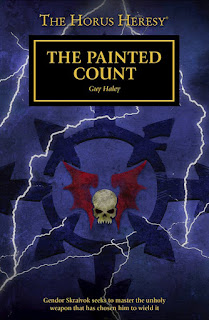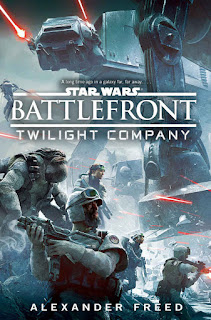I've been meaning to get around to this for a while, and figured I'd try to start 2017 with another run of novella reads. Due to being sick and getting deep into Brandon Sanderson's Mistborn trilogy for most of the month, I didn't quite manage to get as much done as I was hoping, so expect more on that in February and March.
The Story:
"Death and destruction follow the demon wherever he treads, and Gabriel is rarely far behind, waiting for his chance to extinguish the creature known as Temple once and for all.
But in Singapore during the Second World War, a lone soldier in possession of a shattering secret gets caught up in their battle. The knowledge he holds could change the course of their ancient conflict… and the fate of the world."
But in Singapore during the Second World War, a lone soldier in possession of a shattering secret gets caught up in their battle. The knowledge he holds could change the course of their ancient conflict… and the fate of the world."
Disclaimer
The publisher sent me a print ARC of this one last year, along with a book I had requested specifically.
The Review:
A Whisper of Southern Lights is billed as a stand-alone entry in Tim Lebbon's The Assassin series. However, I would still recommend reading the first installment first. While you can read this individually, things make a lot more sense with the things you learn in Pieces of Hate.
The previous book, Pieces of Hate, struck me as a good horror novella. The book actually consisted of two stories, however, the first being a short story called Dead Man's Hand. The difference between both of them was that DMH was narrated from the perspective of an outsider getting caught up with the protagonist, Gabriel, whereas Pieces of Hate gave us a story through Gabriel's own eyes.
A Whisper of Southern Lights mixes both perspectives, varying between the outsider's perspective and Gabriel from chapter to chapter. This works very well in my opinion, especially since I was more fond of the way Dead Man's Hand achieved its air of dark mystery and horror. Here, Tim Lebbon was able to intertwine the supernatural existence of his "hero" with that of a down on his luck war prisoner who just happened to stumble into events larger than himself and getting between Gabriel and his quarry, the assassin Temple. This even led to some cool misdirection as you follow the two characters, which was pulled off nicely in my eyes.
Plot-wise, things are similar enough to the previous book; Gabriel is still hunting Temple, still trying to get his revenge. This time they've ended up in Singapore during World War II, with the secondary protagonist being a soldier facing the japanese invasion. We get scenes in the jungles, in prison camps, and more background on Gabriel, more cool showings from our antagonist Temple, and even some overarching plot progression that has me curious for what's next for this series. While the general idea behind the story follows a similar formula to the other two stories before it, I don't think that's a bad thing. It keeps the feel of the series consistent while allowing Lebbon to provide more set-up and focus on the various settings in greater detail. It is a good compromise in my opinion, though I assume that the chase will come to a stop eventually, as hinted here.
I have to say, though: Where the first book wasn't pretty in any way, and especially gruesome in places, this one could be considered even nastier. The horrors of war are laid on thickly, and the japanese soldiers don't treat their prisoners of war well by any means. If you're a hygiene-freak, this book probably isn't for you, especially when it comes to one section about halfway through. Be prepared to feel grossed out. However, I appreciate that Lebbon did these things. War isn't clean, or pretty, and usually not even glorious. It is a miserable business of dealing death and being dealt your own in return. Where a lot of authors romanticize war, cowboys or pirates in fiction, Lebbon pays great attention to the more vile aspects of it all. Nobody is really a hero in this series, and things can always get a tad worse. I love that.
While A Whisper of Southern Lights isn't as bone-chilling as Dead Man's Hand was for me, it was a solid read that I enjoyed a great deal once I got to it. The author nailed the themes he was trying to gun for, and the feeling of utter misery that struck me with the first book is still as strong as ever. I'll definitely be reading the next book in the series, whenever it sees the light of day.
The previous book, Pieces of Hate, struck me as a good horror novella. The book actually consisted of two stories, however, the first being a short story called Dead Man's Hand. The difference between both of them was that DMH was narrated from the perspective of an outsider getting caught up with the protagonist, Gabriel, whereas Pieces of Hate gave us a story through Gabriel's own eyes.
A Whisper of Southern Lights mixes both perspectives, varying between the outsider's perspective and Gabriel from chapter to chapter. This works very well in my opinion, especially since I was more fond of the way Dead Man's Hand achieved its air of dark mystery and horror. Here, Tim Lebbon was able to intertwine the supernatural existence of his "hero" with that of a down on his luck war prisoner who just happened to stumble into events larger than himself and getting between Gabriel and his quarry, the assassin Temple. This even led to some cool misdirection as you follow the two characters, which was pulled off nicely in my eyes.
Plot-wise, things are similar enough to the previous book; Gabriel is still hunting Temple, still trying to get his revenge. This time they've ended up in Singapore during World War II, with the secondary protagonist being a soldier facing the japanese invasion. We get scenes in the jungles, in prison camps, and more background on Gabriel, more cool showings from our antagonist Temple, and even some overarching plot progression that has me curious for what's next for this series. While the general idea behind the story follows a similar formula to the other two stories before it, I don't think that's a bad thing. It keeps the feel of the series consistent while allowing Lebbon to provide more set-up and focus on the various settings in greater detail. It is a good compromise in my opinion, though I assume that the chase will come to a stop eventually, as hinted here.
I have to say, though: Where the first book wasn't pretty in any way, and especially gruesome in places, this one could be considered even nastier. The horrors of war are laid on thickly, and the japanese soldiers don't treat their prisoners of war well by any means. If you're a hygiene-freak, this book probably isn't for you, especially when it comes to one section about halfway through. Be prepared to feel grossed out. However, I appreciate that Lebbon did these things. War isn't clean, or pretty, and usually not even glorious. It is a miserable business of dealing death and being dealt your own in return. Where a lot of authors romanticize war, cowboys or pirates in fiction, Lebbon pays great attention to the more vile aspects of it all. Nobody is really a hero in this series, and things can always get a tad worse. I love that.
While A Whisper of Southern Lights isn't as bone-chilling as Dead Man's Hand was for me, it was a solid read that I enjoyed a great deal once I got to it. The author nailed the themes he was trying to gun for, and the feeling of utter misery that struck me with the first book is still as strong as ever. I'll definitely be reading the next book in the series, whenever it sees the light of day.






























